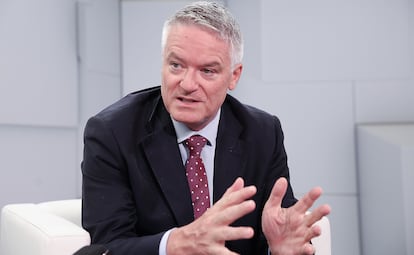OECD Secretary-General: ‘In the years to come, the US will continue to play an important role in driving development’
Despite a projected drop in aid, Mathias Cormann remains optimistic, proposing ways to boost public and private financing at the UN summit in Seville


One week before heads of state, government leaders, and delegations from over a hundred countries signed a commitment in Seville to boost development funding, the OECD published its official development aid forecasts for 2025. These predict a decline of between 9% and 17%.
Mathias Cormann, who has been secretary-general of the OECD for the past four years, remains optimistic despite the forecasts and has brought several concrete ideas to Seville on how to increase the volume of national and private sector resources and improve the debt conditions of the most vulnerable countries. “We need to make every dollar count,” he tells EL PAÍS.
Question. World leaders are meeting to boost development cooperation at the U.N.’s International Conference on Financing for Development, and the organization you represent has published official aid forecasts for 2025, which predict a decline of between 9 and 17%.
Answer: It’s true that this is the second year we’ve seen a substantial negative result. This means, and our data clearly shows this, that we need to make every dollar count. We’ve got to make sure that the money really hits the ground in the most effective way possible and that we leverage it as much as possible to draw in additional private resources. This is one of the areas we are very focused on in Seville.
Q. For the past two days, we’ve been hearing that this summit is a victory for multilateralism. Is there reason to celebrate?
A. It’s an incredibly important summit, and Spain wants Seville to be a kind of launching pad for measures, commitments, and decisions. At the OECD, we are fully committed to multilateralism; we need to continue working together to the best of our ability to tackle all the challenges posed by development funding.
Q. Even though the United States is not at the negotiating table and is making huge cuts to aid.
A. It’s always better for everyone to be around the same table and to be part of the conversation, but I’m sure that in the years to come, the U.S. will continue to play an important role in driving development and growth around the world. Multilateralism has never been easy, but that doesn’t make it any less necessary; we simply have to keep the conversation going.
Q. The OECD has predicted that unless there is an agreement to reform the international financial architecture, the gap between development financing needs and available resources could swell from $4 trillion today to $6.4 trillion by 2030. Is it realistic to continue to think that this gap can be filled?
A. The good news is that from 2015 to 2022, the level of income and revenue to support development funding has increased by 22%. The bad news is that spending requirements have also increased, and they have done so significantly, so the gap has widened. We need to improve how we generate public finance to increase private sector investment. One very important area is domestic resource mobilization, and when we look at some of the lowest-income countries, the tax-to-GDP ratio has remained stagnant at around 11%. Now, our assessment is that for a state to function properly, that tax burden needs to be at least 15%. Since 2015, we haven’t seen an increase in that ratio in the lowest-income countries, and it’s a specific area where we need to achieve concrete results.
Q. And what about debt? U.N. Secretary-General António Guterres said on Monday that the current system is “unsustainable, unfair, and unaffordable.”
A. In addition to providing data for discussion, we have identified that developing local currency debt is one way that can help emerging market economies mitigate some of the risks. Borrowing in hard currencies leaves both governments and companies exposed to exchange rate volatility and increases the risk of default during periods of local currency depreciation. Higher levels of local currency financing can bolster resilience to global financial shocks and support long-term economic development. I am thinking, for example, of small and medium-sized enterprises and the benefits this can bring to them.
Q. What key progress has been made in Seville since the last U.N. summit on development financing in Addis Ababa a decade ago?
A. There’s a much stronger commitment to work in partnership. And we also have a much more complete and clear picture of the diagnosis: we know what needs to be done from now on, and I think there’s greater political will.
Q. Returning to the OECD, there are no African countries in the organization, although there are important partners like South Africa. How does the OECD view Africa at this time?
A. We have a structured and very constructive partnership with the African Union. We recently launched the Virtual Africa Investment Platform, which will have 10 African countries represented until we expand it to another 20. It will serve to present data to counteract misperceptions of risk on the continent, and help boost the level of investment in Africa. As you said, we have a very close relationship with South Africa, which we have also very strongly supported during its G20 presidency, as well as with North African countries such as Morocco and Egypt. I am hopeful that, in the not too distant future, an African country will express interest in joining the OECD as a member.
Q. The OECD maintains that a balance must be struck between restrictions on the export of so-called critical raw materials such as nickel or cobalt and the development of countries that possess these materials, most of which are in Africa.
A. It’s clear that the need for these raw materials will continue to increase massively in the context of the digital transformation and climate change-related technologies. A clear policy framework is needed. Because there’s a great opportunity here to benefit the developing countries that supply these raw materials to the world. And we can’t miss that opportunity.
Q. Amid the global cuts to aid, Spain is one of the few countries that has maintained and is increasing its development aid. It also strongly defends multilateralism.
A. I have been Secretary-General of the OECD for four years, and during that time, Spain has been an incredibly active and very positive voice for multilateralism. Beyond the leadership it is showing at this summit in Seville, in many areas related to development, climate, and digital trade, Spain is taking a very strong position and has a constructive voice.
Q. Although it is far from leading the field: it allocates just 0.7% of GDP in cooperation.
A. I have been Australia’s finance minister and understand the challenges of making the numbers add up. I’m sure that Spain does as much as Spain can afford and that if there’s opportunity to do more, Spain will do more. I am optimistic. We have to shape the best possible future, and we’re all in this together.
Sign up for our weekly newsletter to get more English-language news coverage from EL PAÍS USA Edition
Tu suscripción se está usando en otro dispositivo
¿Quieres añadir otro usuario a tu suscripción?
Si continúas leyendo en este dispositivo, no se podrá leer en el otro.
FlechaTu suscripción se está usando en otro dispositivo y solo puedes acceder a EL PAÍS desde un dispositivo a la vez.
Si quieres compartir tu cuenta, cambia tu suscripción a la modalidad Premium, así podrás añadir otro usuario. Cada uno accederá con su propia cuenta de email, lo que os permitirá personalizar vuestra experiencia en EL PAÍS.
¿Tienes una suscripción de empresa? Accede aquí para contratar más cuentas.
En el caso de no saber quién está usando tu cuenta, te recomendamos cambiar tu contraseña aquí.
Si decides continuar compartiendo tu cuenta, este mensaje se mostrará en tu dispositivo y en el de la otra persona que está usando tu cuenta de forma indefinida, afectando a tu experiencia de lectura. Puedes consultar aquí los términos y condiciones de la suscripción digital.








































